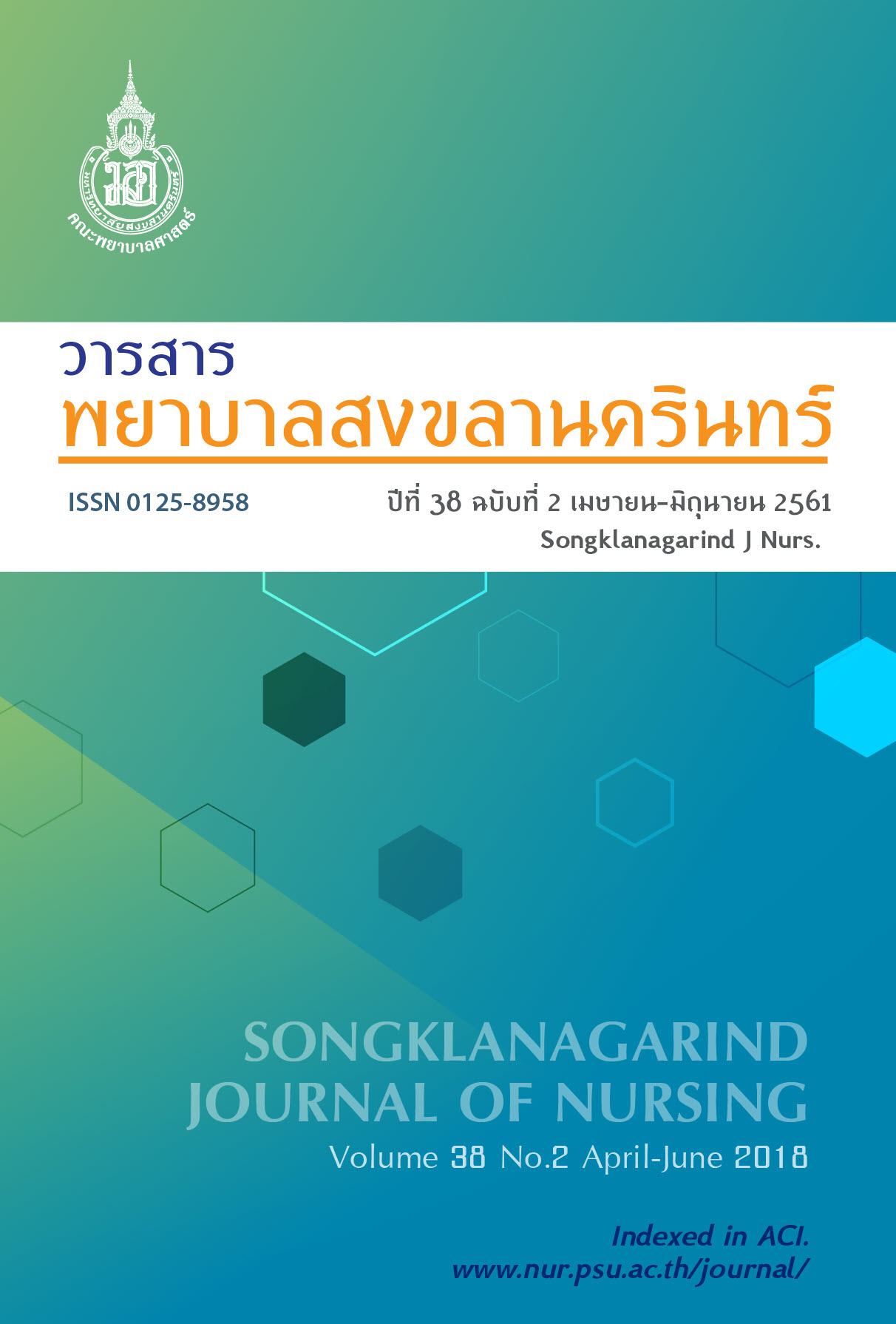The Effect of Knowledge Provision on Perceived Self-Efficacy in Psychotic Screening of Village Health Volunteers
Main Article Content
บทคัดย่อ
This one group pretest-posttest design aimed to study the effect of knowledge provision on perceived self-efficacy in psychotic screening of village health volunteers (VHVs). The sample was 33 VHVs at Khlong Hae village, using purposive sampling. The VHVs were educated for 5 hours about psychotic, attitude toward psychotic patients, VHVs’s roles and functions, as well as psychotic screening. The data collection tools were demographic data form and the perceived self-efficacy in psychotic screening. The outcome of the study was immediately measured after knowledge provision. The data were analyzed using percentage,mean, standard deviation and paired t-test
The result showed that most of VHVs were female (93.9%), the working time of the VHVs were ≤ 10 years (51.5%), had experienced in training course in caring for psychiatric patients (60.6%), did not have experience in caring for psychotic patients (42.4%). After receiving knowledge, VHVs had higher mean score of perceived self-efficacy than before attending this training statistically significant at 0.001. Therefore, the result illustrated that this education could enhance the perceived self-efficacy in psychotic screening of VHVs.
Article Details
เอกสารอ้างอิง
2. Department of Mental Health, Ministry of Public Health. The instructor’s manual of accession and taking care of psychotic patients for Registered Nurse and Public Health Technical Officer. 5th ed. Bangkok: Bureau of Mental Health Service Administration; 2015. Thai.
3. Chiuydee S, Sangon S, Nintachan P. The study of community psychiatric and mental health practice among village health volunteers. The Journal of Psychiatric Nursing and Mental Health. 2017; 31(1): 41-59. Thai.
4. Buatik K.Work erformance of community mental health in health volunteers in Kumpawapi district Udonthani province [dissertation]. [Khon Kaen]: Khon Kaen University; 2008. 94 p.
5. Chatchawangkoon R. Training course about rehabilitation knowledge for public health volunteers in 2010. Bangkok: The War Veterans Organization Press; 2010. Thai.
6. Society and Health Institute. The study about potential assessment of public health volunteers with changing role in potential assessment of public health volunteers with development strategy. Bangkok: Health Systems Research Institute; 2006. Thai.
7. Bandura A. Self-efficacy: The exercise of control. New York: W.H. Freeman and Company; 1997.
8. Anunta P, Tonganake J. The effectiveness of home visit and training program in village health volunteers in Khwao, Selaphum, Roi Et. J of the office of DPC Khon Kean 6. 2012; 20(1): 1-8. Thai.
9. Prombutr P, Sookpool A, Phinyo K, et al. The effect of self-efficacy program toward knowledge and self-efficacy of village health volunteers in diabetic and hypertension patient care in community in northeast province. Songklanagarind J Nurs. 2015; 35(2): 113-28. Thai.
10. Polit DF, Beck CF. Nursing research: Generating and assessing evidence for nursing practice. 9th ed. Philadelphia, PA: Lippincott William & Wilkins; 2012.
11. Srisatitnarakoon B. The methology in nursing research. 5 th ed. Bangkok: U & I Inter Media; 2010. Thai.
12. Kampan S, Kampan P. Perception of Self-efficacy in advanced practice nurse (APN) on giving general anesthesia of nurse anesthetist. Journal of Nursing Division. 2010; 37(2): 109-26. Thai.
13. Keeratiphakhawat Y, Rodchumdee B. The effect of perceived self-efficacy promoting program on maternal caring behavior to prevent recurrent pneumonia in toddler. JNSCU. 2010; 22(1-3): 82-93. Thai.
14. Chatchaiphan T, Junprasert S, Rattanagreethakul S. Effects of village health volunteers empowerment on perceived self-efficacy and caring behavior for persons with diabetes in community. The Journal of Faculty of Nursing Burapha University. 2016; 24(3): 83-93. Thai.
15. Phinyo P, Phinyo K, Janhauna S, et al. The effectiveness of self-efficacy enhancement program on knowledge, attitudes and behaviors of the village health volunteers providing the long term care for the Elders, Khon Kaen provice. Songklanagarind J Nurs. 2017; 37(3): 109-20. Thai.
16. Khaopatumthip K. Participation of public health volunteers for tambon health promoting hospital in Buddha-monton distric Nakornpathom province [thesis]. [Nakornpathom]: Srinakarinvirot University; 2010. 173 p.


